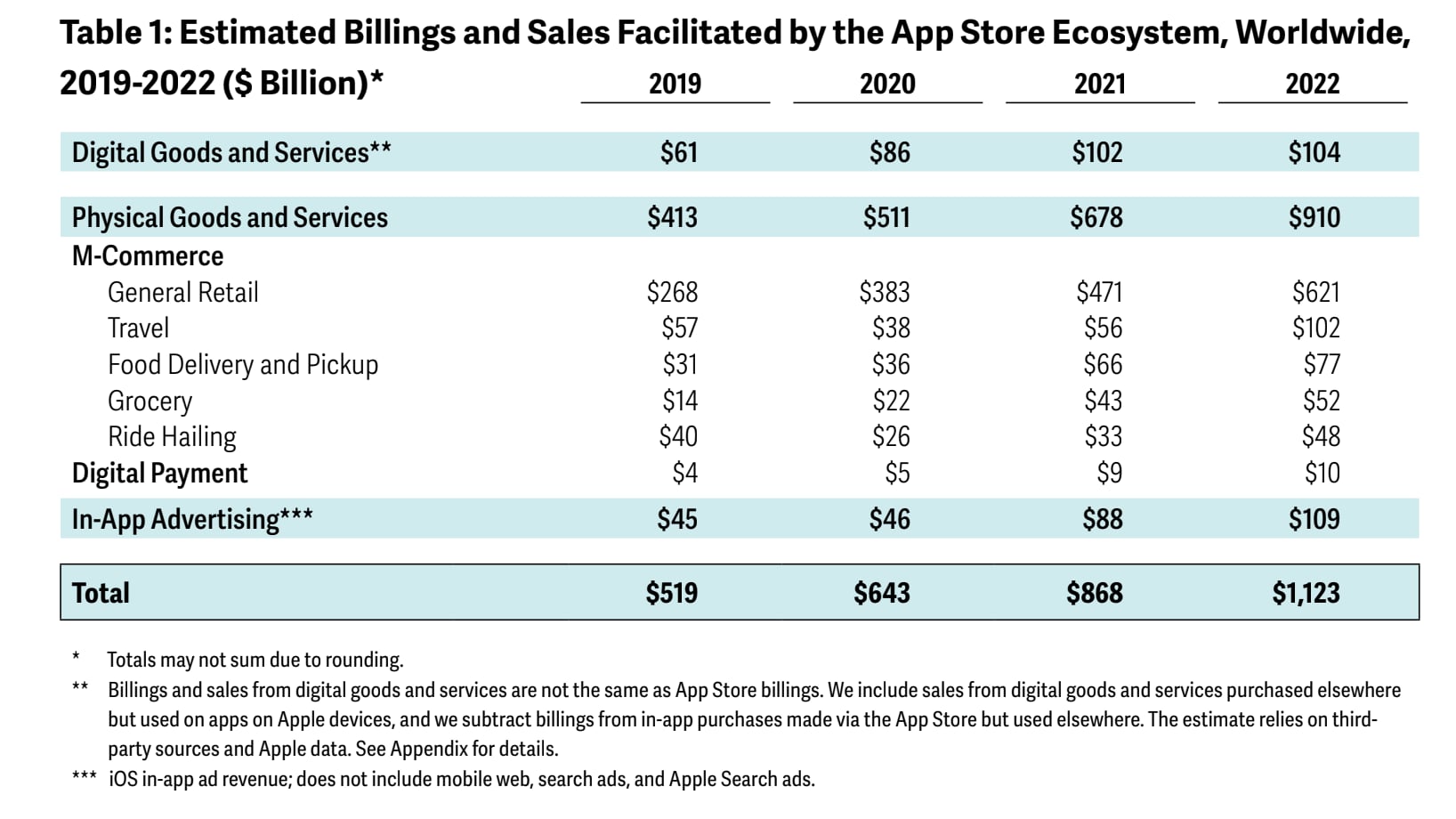05.31.2023
The App Store was responsible for an estimated $1.1 trillion in developer billings and sales in 2022, according to an Apple-sponsored study conducted by economists from Analysis Group. Apple shared

A total of $910 billion of the $1.1 trillion estimate comes from the sales of physical goods and services that happened outside of the App Store, while $109 billion was from in-app advertising, and $104 billion was from digital goods and services. The estimate includes sales from businesses of all sizes, large and small, and for the physical goods and services, Apple did not collect commission.
Apple charges a 15 to 30 percent fee for app purchases, in-app purchases, and in-app subscriptions through the App Store, but it does not collect a fee when customers do things like purchase groceries online or pay for an Uber ride using an Apple device. Note that in the study terms, "billings" is a reference to app purchases, in-app purchases, and subscriptions, while "sales" pertains to goods and services.
"We've never been more hopeful about -- or more inspired by -- the incredible community of developers around the world," said Tim Cook, Apple's CEO. "As this report shows, the App Store is a vibrant, innovative marketplace where opportunity thrives, and we're as committed as ever to investing in developers' success and the app economy's future."There was a 29 percent increase in developer billings and sales year over year, with the travel and ride hailing services seeing the most notable growth. The App Store has seen steady growth over the last several years, going from $643 billion in 2020 to $868 billion in 2021, before crossing a trillion in 2022.

Analysis Group points out that direct app monetization is a "small fraction" of the commerce facilitated by the App Store, with developers able to monetize through ad-supported content, goods and services sold outside of the App Store, and physical goods and services.
The study suggests that beyond in-app purchases and subscriptions, the App Store provides a "trusted platform" for businesses to sell their products, and it points out the many policies that Apple has implemented to "foster user trust" and prevent fraudulent transactions.
In the 15 years since the App Store launched, developers have earned a total of $320 billion directly from the App Store. There are 123 times more apps available now compared to the end of 2008, with more than 370 billion app downloads since launch. Games make up the largest number of apps, followed by business and education apps.
This is the second study from Analysis Group that Apple has shared this month, with the prior study focusing on the App Store successes of small businesses. Today's study offers a wider look at the total App Store ecosystem. Analysis Group has been providing similar reports for Apple since 2020 as Apple fights against App Store regulations across multiple countries.
The two studies published in May come amid rumors that Apple plans to begin supporting sideloading in Europe following the launch of iOS 17. The Digital Markets Act requires Apple to allow European customers to obtain apps outside of the App Store and to use alternate payment methods, and Apple will need to allow sideloading by 2024. Apple has argued against sideloading because it skirts the protections offered by the App Store and will require a complicated system where Apple collects a reduced commission from developers.
Sideloading will reportedly only be available in Europe where it is mandated, but other countries are considering similar legislation, and Apple is undoubtedly hoping to discourage regulators from adopting similar laws. In the United States, for example, the Open App Markets Act and the American Innovation and Choice Online Act would allow developers to use non-Apple app stores and alternative payment systems. Studies like this that are widely publicized work to further Apple's narrative about the size of the App Store ecosystem and the potential consequences of dismantling its protections.
Analysis Group's full study can be accessed through the Apple Newsroom article. It goes into more depth on both App Store ecosystem earnings in 2022 and 15-year growth metrics.
This article, "Apple-Funded Study Suggests App Store Ecosystem Facilitated $1.1 Trillion in Sales in 2022" first appeared on MacRumors.com
Discuss this article in our forums
You may also be interested in this
No matter how great Apple…
06.05.2023
Apple makes iOS 17 and macOS Sonoma sound fantastic. But Apple will also make them sound ready, and they really, really are not. Don't risk bricking your device.Don't do this
Sonnet debuts new Echo 11…
06.02.2023
Sonnet today is refreshing its lineup of Thunderbolt 4 hubs with a new and even more versatile option. Looking to be more flexible out of the box, the new Sonnet
Apple’s new Mac Studio an…
07.08.2023
Both the M2 Max and M2 Ultra-powered versions of the Mac Studio are discounted this weekend. | Photo by Amelia Holowaty Krales / The Verge It’s a good week for
Netflix removes its Basic…
06.27.2023
More changes are coming this year to Netflix as the streaming battles intensify into the summer season. Netflix… The post Netflix removes its Basic Plan in Canada appeared first on
Apple, please make transp…
05.18.2023
Macworld Apple’s new Beats Studio Buds + are now available and there’s one obvious reason why you might get them instead of a pair of AirPods Pro: They’re available in
Apple quietly drops lawsu…
04.29.2023
Apple has quietly withdrawn its lawsuit against former executive Gerard Williams III in a filing posted on Friday (via Bloomberg). Williams was described as critical to the development of the
Apple sweeps prestigious …
05.19.2023
Apple recently received one of the most difficult awards to obtain in advertising with an accessibility film from 2022 and a Rihanna song from Apple Music.Apple won awardsAt the Hammerstein
Daily Deals: M2 Mac mini …
05.16.2023
Today's top bargains include a Dyson Supersonic hair dryer for $280, 27% off an LG NanoCell Alexa Built-in 4K Smart TV, Apple Watches Series 3, 4, and 5 from $85,


